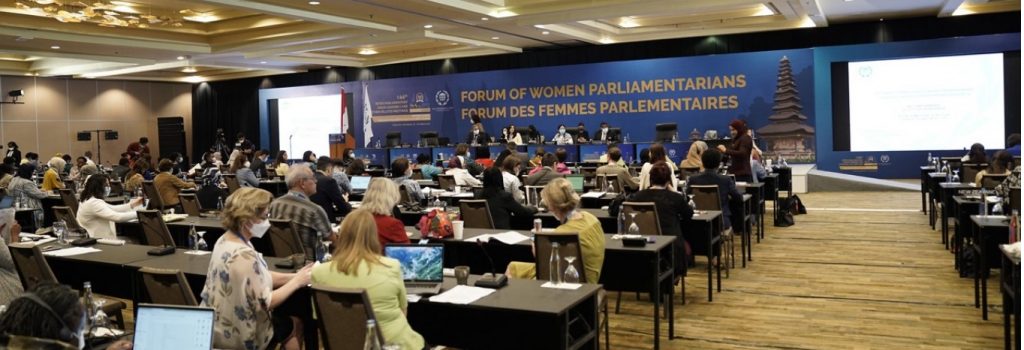Parliaments promote women’s, children’s and adolescents’ health in the time of COVID-19

Parliamentarians chose to shine a bright light on the importance of health equity at the opening day of the recent 144th Assembly of the Inter-Parliamentary (IPU), with a particular focus on the promotion of women’s, children’s and adolescents’ health.
Some 110 national parliaments gathered in Nusa Dua, Indonesia, where a frank discussion took place at the 33rd session of the Forum of Women Parliamentarians about the impact of COVID-19 on health, including on sexual and reproductive health and rights.
Global disruption to sexual and reproductive health and rights
The latest World Health Organization (WHO) survey shows that one third of countries are still experiencing disruptions to essential health services, including antenatal and postnatal care services, identification and care for intimate partner violence, and safe abortion services. Nearly 40 percent report disruption to family planning and contraception services.
This data contrasts starkly with important health gains which were underway prior to COVID-19. Maternal mortality was reducing, 75 percent of countries included first-line healthcare support for survivors of violence against women and girls in their policies, and girls were less likely to be married and have children before the age of 18.
Now, disruption of essential sexual and reproductive health services puts those same individuals in positions of greater vulnerability, disempowering and exposing them to preventable health risks.
 “The situation is distressing, but unfortunately not surprising,” explained Dr Doris Chou, a medical officer in the WHO Department of Sexual and Reproductive Health and Research (SRH), including UNDP-UNFPA-UNICEF-WHO-World Bank Special Programme of Research, Development and Research Training in Human Reproduction ( HRP).
“The situation is distressing, but unfortunately not surprising,” explained Dr Doris Chou, a medical officer in the WHO Department of Sexual and Reproductive Health and Research (SRH), including UNDP-UNFPA-UNICEF-WHO-World Bank Special Programme of Research, Development and Research Training in Human Reproduction ( HRP).
“We know from previous experience that when health systems are disrupted, sexual and reproductive health and rights quickly suffer,” she continued.
Dr Chou joined the session alongside representatives from the Partnership for Maternal, Newborn and Child Health (PMNCH), UN Women and Girls Not Brides to give evidence on disruption to sexual and reproductive health and rights, and share tools which can help parliamentarians as they take corrective action.
Bridging the gap between science and policy
In 2018, WHO and the IPU signed a memorandum of understanding, signaling crucial political support for the right to health for all. Together with universal health coverage (UHC) and global health security, the memorandum recognizes promoting health, especially for people living in vulnerable situations, as the priorities for WHO/IPU collaboration.
“The disruption and suffering caused by COVID-19 is a reminder that bridging the gap between science and policy is a matter of life and death,” said Dr Gaudenz Silberschmidt, WHO Director of Health and Multilateral Partnerships, and Head of the WHO delegation to the IPU Assembly.
WHO has resources which can support parliamentarians in the COVID-19 response, including on strengthening sexual and reproductive health and rights. Tools provide guidance on maintaining essential services, introducing digital health interventions such as telemedicine and supported self-care, and up to date policy resources with country data and regional comparisons.
Parliamentarians take action to leave no one behind in the COVID-19 response
The IPU has a long history of improving parliamentarians’ understanding of and advocacy for sexual and reproductive health issues in their own countries.
Throughout the session, parliamentarians made strong statements in support of sexual and reproductive health, and shared effective actions taken in their countries to strengthen services in the context of COVID-19.
Examples from different parliaments included efforts to increase national health budgets, identify and introduce gender-responsive legislation, review and hold accountable government programmes, and advocate for changing the root causes affecting the health and well-being of their constituents.
A call for structural change, grounded in human rights and gender equality
Access to quality, rights-based and affordable comprehensive sexual and reproductive health services are a fundamental part of UHC. The pandemic has exacerbated health inequalities; pandemic recovery is an opportunity to change the structures that perpetuate them in the first place.
Dr Chou paid tribute to the work of the IPU Advisory Group for Health, together with the WHO Department of SRH, in developing resolutions on parliaments’ role in securing the health of women, children and adolescents, and achieving UHC by 2030.
These resolutions reflect not only powerful commitments, but powerful levers to act.
